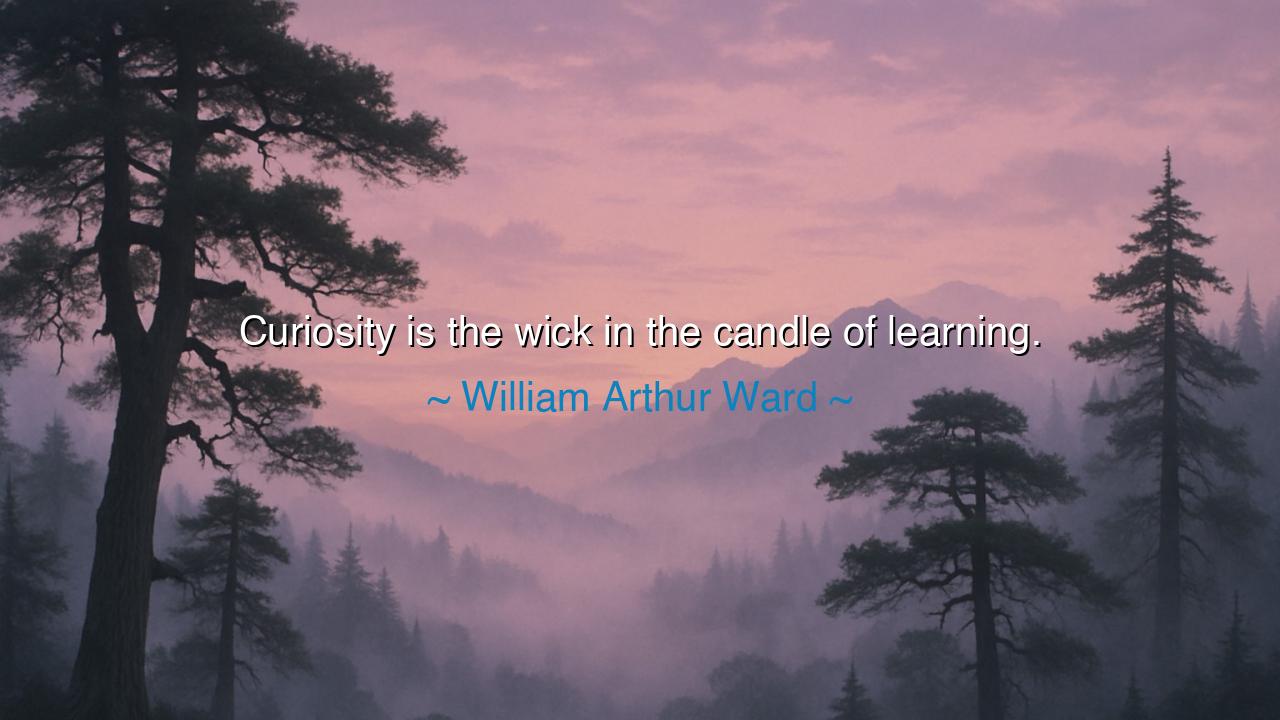
Curiosity is the wick in the candle of learning.






“Curiosity is the wick in the candle of learning.” — so wrote William Arthur Ward, the philosopher of hope and wisdom, whose words have kindled the hearts of students and seekers across generations. In this image of fire and light, Ward captures the sacred relationship between curiosity and learning — that the hunger to know is what gives flame to understanding, and without that hunger, knowledge lies cold and unlit. The candle may hold wax and shape, but without its wick, it cannot burn. So too with the human mind: it may be filled with potential, yet only curiosity — that spark of wonder, that yearning to explore — can transform it into a light that illuminates the world.
Ward was not a philosopher of the academy, but of the human spirit. His words arose from reflection upon the power of inspiration and education. He saw that learning is not a duty imposed by others, but a fire ignited within oneself. The wick of curiosity is what draws the flame of knowledge upward; it sustains and feeds the light. Without it, the candle is useless — beautiful, perhaps, but silent and dark. Thus, in his wisdom, Ward reminds us that curiosity is not a trivial trait, but the essence of enlightenment. For all great minds — scientists, poets, and explorers alike — began their journey not with answers, but with questions.
To be curious is to live with eyes open and soul alert. It is to gaze upon the world not with indifference, but with awe. The curious mind does not accept what is known as final; it hungers to discover what lies beyond. The ancients called this the love of wisdom, and from it was born philosophy, art, and science. The Greeks who mapped the stars, the scholars of Alexandria who preserved the words of worlds long vanished, the inventors who tamed the elements — all were children of curiosity. For them, every mystery was an invitation, every shadow a promise of light.
Consider the story of Galileo Galilei, the astronomer who dared to look beyond the heavens as they were taught. In an age when men believed the Earth was the center of the universe, his curiosity led him to turn his telescope toward the stars — and there, he saw what no man before him had seen: moons circling Jupiter, worlds in motion, a vast cosmos alive with change. His curiosity became his courage, his wick feeding a flame that would light centuries of discovery. Though condemned for his findings, Galileo’s spirit was not extinguished — for the fire of curiosity cannot be smothered by fear. It burns silently in the dark until, one day, it reignites the world.
Curiosity, then, is not mere questioning — it is courageous wonder. It dares to ask where others are silent; it seeks understanding where others are content with ignorance. It is the force that drives the artist to paint what has never been seen, the scientist to experiment beyond failure, the philosopher to ponder the invisible. It is the heartbeat of progress, the silent vow of every learner: “There is more to know, and I will find it.” Without curiosity, learning becomes empty ritual; with it, even the simplest lesson becomes an adventure.
Ward’s metaphor also reminds us that the wick and the flame must be tended. A candle left unattended may burn out too quickly, just as curiosity without discipline can fade into distraction. To learn deeply, one must protect and feed the flame — with patience, focus, and humility. The world may tempt you with quick answers, but the wise seek to understand, not merely to know. The curious learner asks not only “what” and “how,” but also “why.” And in the asking, the soul grows brighter, steadier, more radiant.
Therefore, my children, guard your curiosity as you would guard fire in the cold. Feed it with wonder. Protect it from cynicism, which is the wind that seeks to blow it out. When you meet the unknown, do not turn away; step closer and listen. Ask questions. Read widely. Observe deeply. Speak with those whose experiences differ from your own. Every question you ask is another spark, another light upon the path of wisdom.
For the candle of learning burns not for a single moment, but for a lifetime. The mind that ceases to be curious grows dim, but the one that continues to wonder never falls into darkness. Remember William Arthur Ward’s truth: “Curiosity is the wick in the candle of learning.” Keep your wick alive, and your light will shine — through the storms of ignorance, through the shadows of fear, illuminating not only your path, but the paths of those who walk beside you.






AAdministratorAdministrator
Welcome, honored guests. Please leave a comment, we will respond soon